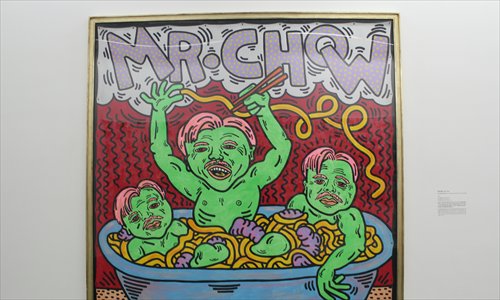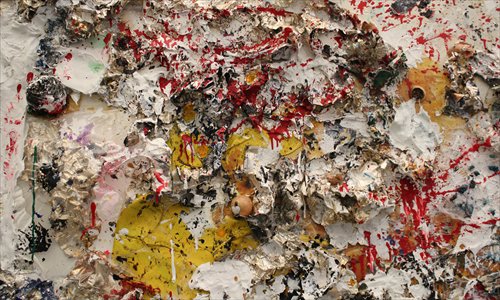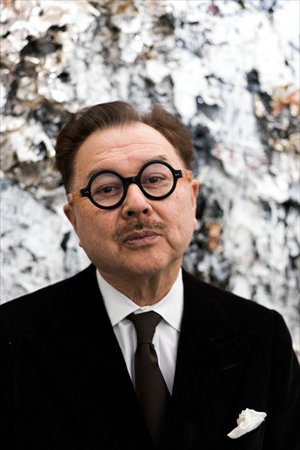Rebuilding An Identity

Mr. Chow as Green Prawn in a Bowl of Noodle by Keith Haring Photo: Xu Ming/GT

Michael Chow's painting

Michael Chow Photo: Courtesy of UCCA
Son of the late Peking Opera master Zhou Xinfang (1895-1975), he created the internationally known Chinese restaurant chain Mr. Chow and became the darling of the fashion world. Now he returns to where he originally started: art.
Michael Chow (Zhou Yinghua), better known abroad than in China, came back to his home country to open his first solo exhibition Friday after a 50-year gap. The Michael Chow: Voice for My Father exhibit, part of a series of activities commemorating the 120th anniversary of the birth of Zhou Xinfang, weaves together Chow's legendary life experiences and, more importantly, reestablishes his old and new identity as an artist.
"I have lived many, many lives and I am lucky to have done that. But among all the identities, if I have to pick a favorite one, it would be that of the artist, which will be the most important thing for the rest of my life," Chow told the Global Times.
Qi-style painting
Jovial and energetic, Chow does not resemble a person of his age. The 75-year-old veteran wearing his emblematic Cutler & Gross glasses is so full of energy that he could not let his hands or legs rest during the interview with Global Times on Wednesday, clapping or making gestures with passion and stamping his feet several times, imitating a Peking Opera performer's action on stage, to explain his point.
His inner power and energy is fully reflected in his art works on display at the Ullens Centre for Contemporary Art in Beijing. As the most important part of the exhibition, the debut display of Chow's 12 representative works on the Chinese mainland is rather impressive.
All the exhibited paintings are large expressionist works that convey the ideas and passion of the artist through bright colors that reflect what we see in daily life. Appearing an ink painting or expressionist work from a distance, as you walk closer you find that they are a cluster of things ranging from US dollar notes, gold leaves, raw eggs, silver, gloves or even trash. In a series of works named Four Seasons, Chow uses post-modernist technique, bold colors and a wide range of materials, giving the audience a large space to ponder.
While maintaining the cultural elements in his works, Chow's art practice is regarded by many critics as a bridge between the painting traditions in China and abroad. But to Chow, these paintings are predominantly based on his personal style, inheriting the tradition of the school of Qi, which represents his father Zhou Xinfang's philosophy of Peking Opera performance.
Zhou's voice broke in 1911, a key attribute for a Peking Opera performer. He survived by creating his Qi style that placed the overall stage performance above the voice.
"Like my father, I had an incident too in my art career. I was displaced in London and lost everything," Chow said. "There are many features of Qi style, but if you have to pick one, it is authenticity and truth. It is actually an attitude anyone can adopt.
"He was also an expressionist with the same foundation as my works."
As an extension of Qi style, Chow's paintings incorporate a variety of materials and look like a collage, impressing the audience with their power and authenticity.
"My paintings are like collages, as you can see, and to me the whole world is made of collages," he said.
'Golden' dream
It took Chow 50 years to pick up the brush again.
Born in Shanghai in 1939, Chow is son of Zhou Xinfang, one of the most famous Chinese performing artists of the 20th century who was at the same level as Mei Lanfang at that time. Influenced by his father's dedication to Peking Opera, Chow once dreamed of being like his father. But the dream was interrupted after he was sent to study in London at the age of 12.
A few years later he studied at the architecture department of the Saint Martin's School of Art and tried oil painting, but failed in the art circle there as in his opinion it was unready to accept a Chinese face.
"I was not encouraged at that time in my artistic pursuit and lacked confidence. I thought I had to forget about it, by fate," he said. There was little support for a Chinese artist in the West then, he explained.
Chow survived by opening an upscale Chinese restaurant in London that won the approval of tastemakers worldwide for its high-end Chinese cuisine and theatrical presentation and design. Now a popular chain with celebrities, artists and politicians, Chow regards it as another channel to let the West see the majesty of Chinese culture.
"But I never completely gave up my passion for art. Once you are an artist you are an artist. But I did change the medium. I turned that into a theater and expressed my artistic thoughts with details. Every detail is universal," he said.
Chow dropped the brush for nearly 50 years, until art curator Jeffrey Deitch, former director of the Museum of Contemporary Art, Los Angeles, encouraged him to take up fine arts again in 2012.
"He saw one of my paintings in 1962 by chance and was impressed by it," Chow said. "By good luck, I got a good review for my first painting I created two-and-a-half years ago." Then he began to gain confidence.
Once it got started, he decided to devote the rest of his life to it. "In the past two-and-a-half years, I painted actively and passionately, day and night, encouraged almost single-handedly by Jeffrey Deitch and supported by my family, wife and friends," Chow told the Global Times. He said he knows very well that that there is not much time left for him.
Now full of confidence in rebuilding his kingdom of art, Chow admitted that there might be suspicion from the West, where he's built his fame, about his identity changing from a merchant to an artist.
"The art world doesn't like a newcomer. They need time to see and change their perception. The suspicion for me will be more from the West that knows I'm a restaurant owner. But in China, as an inheritor of Qi style, I hope they can treat me more fairly and maybe I will be more accepted."
Besides Chow's paintings, the exhibition also has two other sections that display archival images of Zhou Xinfang on stage and Chow's collections of portraits from world famous artists including Andy Warhol, Jean-Michel Basquiat and Julian Schnabel.
The exhibition will tour Shanghai and The Andy Warhol Museum after it closes in Beijing on March 22.